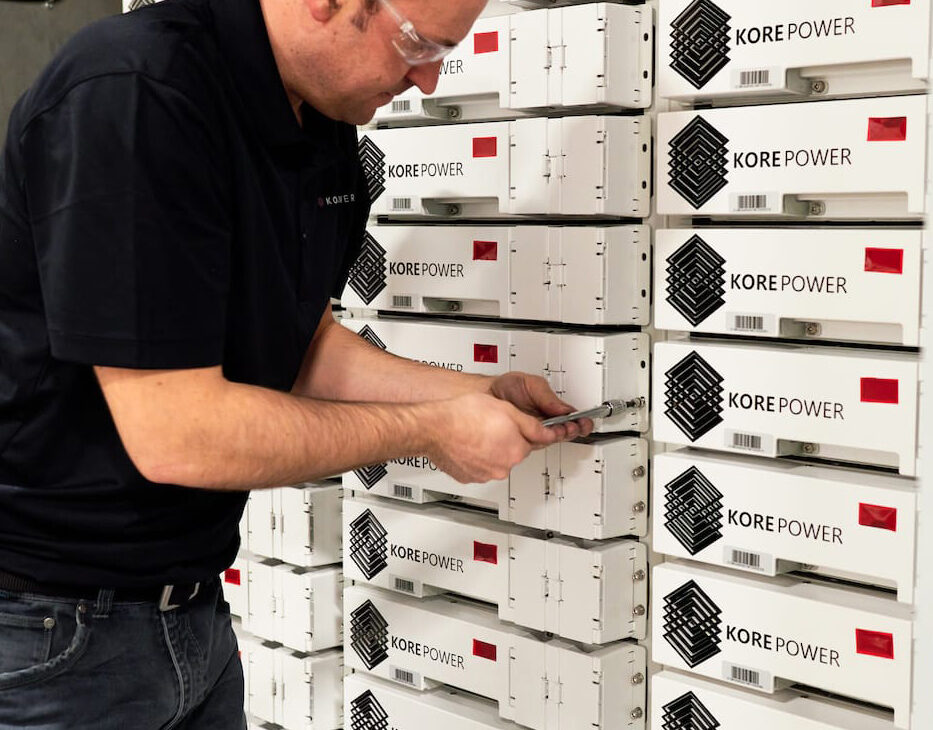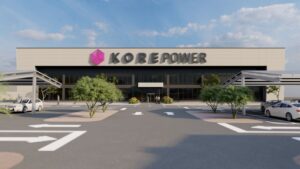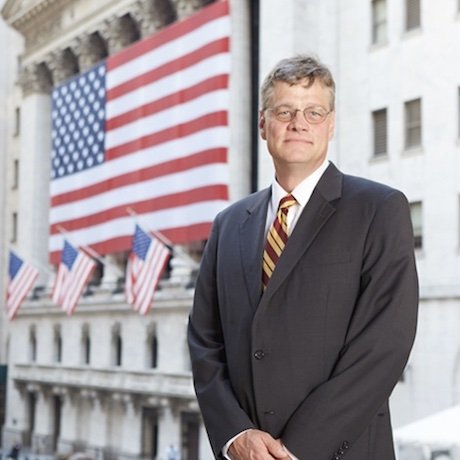
KORE Power / Company Spotlight
KORE Power hit the ground running since merging with Northern Reliability Inc. in Waterbury, VT.
Battery cell technology plays a pivotal role in the transition to renewable energy.
Lightweight, dense, and rechargeable, batteries efficiently store and distribute power from sources such as solar or wind. But they haven’t always been readily available or locally sourced. Few domestic manufacturers make large-scale lead- or lithium-based systems to support a greening grid.
“Seven years [ago], electric vehicles were a topic of discussion, and energy storage was just beginning,” said Lindsay Gorrill, the CEO/Co-Founder of KORE Power. “I envisioned a future where these two elements would be interconnected.”
KORE was co-founded in 2018 by Gorrill and Paul Coombs to fill a critical hole in the energy storage market –– and today, they sell to a much wider audience than just electric vehicles (“EVs”).
Over the past five years, KORE has expanded to over 125 employees, acquired Vermont-based Northern Reliability Inc. (“NRI”), and broke ground on a two million square foot production facility. In a recent interview with VCET, Gorrill projected optimism about the company’s future.
“KORE will be a fixture in North America for a long time. We’ll keep developing our technology… [and] be a really important part of the electrification of North America and other parts of the world.”
Vermont roots
KORE Power wouldn’t be where it is today without the acquisition of NRI.
Based in Waterbury, Vermont, NRI brought over 50 years of experience in the energy storage integration field. The two teams started working together in 2019 on the Nomad Transportable Power project, which is when Gorrill first realized the potential of combining the manufacturer and the integrator.
“Full integration of our product line allows us to provide better service, superior performance and safety,” said Gorrill in a 2022 press release. “KORE Solutions brings the full weight of NRI’s expertise and support to optimize our storage technology offerings.”
KORE Solutions, still in Waterbury, has grown by 300% in the last two years and is on track to more than double that total in the next 18 months.
“We are fortunate in that we’ve got some great engineering programs fairly local to us,” said Gregg Noble, Vice President of Strategic Partnerships and Sales at KORE. “And we are able to capture young engineers who want to absorb all of that legacy knowledge and be involved in the renewable energy sector.”
Why KORE, why now
Amid job losses in the fossil fuel industry, there’s a growing demand in the U.S. for energy storage systems (ESS) and EVs. And as the fossil fuel sector declines, there are opportunities to reclaim lost jobs through the renewable energy industry.
“It’s a big goal of ours to bring everything home as much as we can – and we’re trying to do the same thing with the supply chain,” said KORE President Jay Bellows. “The cost of doing everything has gone up. Bringing [the supply chain] here helps the industry grow substantially.”
Today, KORE stands as a leading U.S.-based developer of battery cell technology, with clients in energy storage, e-mobility, utility, industrial and defense markets. Their clientele spans 44 countries and all seven continents – thanks to help from their legacy, NRI.
For example, recent projects include commissioning the largest domestic commercial industrial battery microgrid in Arkansas and working with integrators like French-based Nidec to incorporate its batteries into large-scale energy solutions.
“We have a lot of customers that just want batteries, and some want just cells to put in their own packets for EVs,” said Bellows in an interview with Solar Power World. “We have a solutions group as well and offer complete systems through KORE Solutions.
KOREPlex and future optimism
Last June, KORE secured an $850 million conditional commitment from the U.S. Energy Department to build KOREPlex, an advanced battery cell manufacturing facility in Buckeye, Arizona.
Spanning two million square feet, the facility aims for a 12 GWh annual production capacity with net-zero emissions and will provide employment for over 3,000 people. The size of such a facility represents the future that Gorrill, Bellows, and Noble –– among others –– see for the company.
“As an American company, we have always maintained a laser-focus on increasing domestic battery manufacturing,” said Gorrill. “This focus stems from a deep understanding of the critical importance that this sector holds in supporting the growth of electric mobility and in modernizing our electric grid in secure and efficient ways.”
Construction at the KOREPLEX site is ongoing and production is expected to begin in 2025.
“Here in the States, as we try to electrify our world, it’s going to be difficult for that to happen without storage,” said Bellows. “As we grow a renewable footprint with solar, wind, hydro, all of those things, we have to have a way to store that energy. It’s the perfect time to build out energy storage.”
Learn more about KORE Power’s team, product, and growth here. You can also find them on LinkedIn here.




